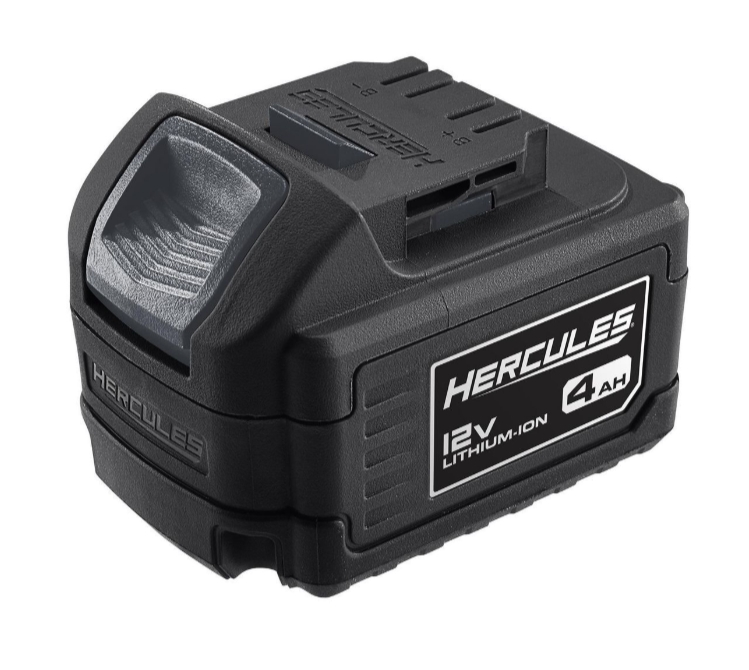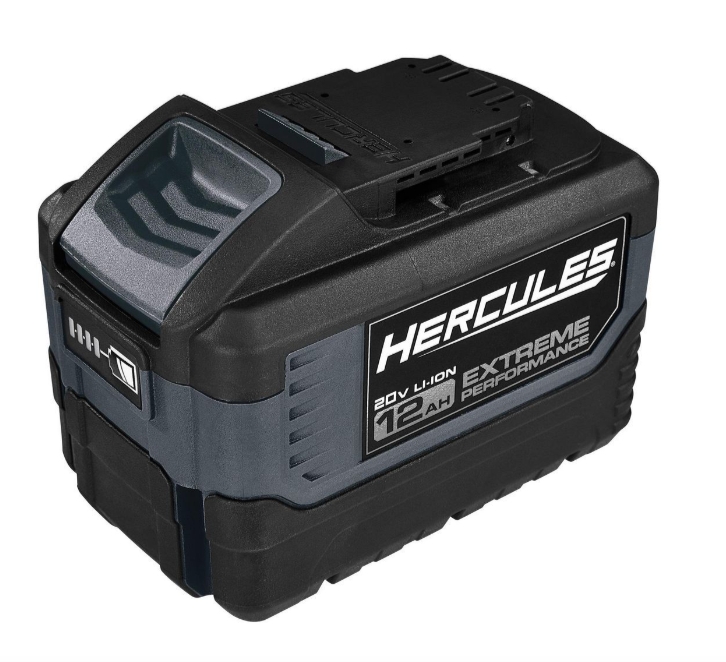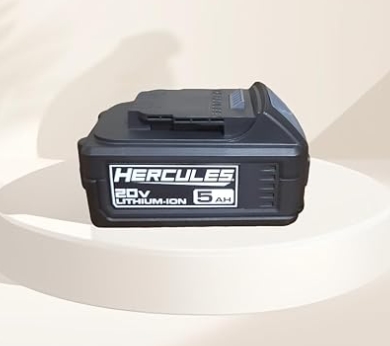
HERCULES 12V 4 Ah Lithium-Ion Compact Lightweight Battery
- The HERCULES™ Lithium 4 Ah Battery delivers plenty of power and runtime for the HERCULES™ 12V platform. The easy-view fuel gauge tells you exactly how much power remains before you need to recharge.
- Durable electronic controls
- Innovative temperature and overload protection optimizes performance for long battery life
- Easy-view fuel gauge displays battery charge level
- Durable impact resistant housing protects against drops and vibration
- Works with all HERCULES™ 12V cordless tools
$34.99

HERCULES 20V 12 Ah Extreme Performance Lithium-Ion Battery
- This HERCULES™ 20V 12 Ah Extreme Performance Lithium-Ion Battery uses 21700 battery cell technology for more power and runtime. Extreme Performance technology ensures that this battery is optimized for high-demand tools in order to power through some of the toughest jobs. Get up to 90% more power*, 145% more runtime** and 140% more cuts per charge***. The easy-view fuel gauge tells you exactly how much power remains before you need to recharge. This is the largest battery in the HERCULES™ 20V system and provides the maximum runtime
- Designed for high-demand tools to power through the toughest jobs
- Innovative temperature and overload protection optimizes the battery and tool during heavy use
- High performance lithium-ion battery cells
- Impact resistant overmold increases protection from drops and jobsite debris
- Works with all HERCULES™ 20V cordless tools
$139.99

20V Max 5.0 Ah Hercules XP Battery
- The jobsite tough 12V Hercules cordless compact drill driver delivers plenty of power in tool that is 35% more compact.* The 2-speed 4 pole motor produces 0-400/0-1500 RPM for effortless drilling and fastening. A built-in LED light with delay after trigger release gives you a clear view in dark spaces. The heavy duty Jacobs ratcheting chuck provides the ultimate in bit retention.** Buy with confidence with an included no-questions-asked risk-free trial, extendable for up to 2 years. – Lightweight and compact design reduces fatigue, with plenty of power for high speed fastening and driving – Two-speed transmission, 19 clutch settings, and variable speed trigger delivers precise speed and torque settings – All metal gear construction built to withstand jobsite abuse – Bright LED light illuminates work area – Jacobs 3/8 in. chuck provides ultimate bit retention
$68.88
As I stared at the dead battery in my drill on a Sunday afternoon with a half-finished deck and guests arriving in three hours, I made myself a promise: never again would I be caught powerless in the middle of a project. That’s when my journey into the world of power tool batteries began, specifically with Hercules batteries. After countless hours of research, testing, and real-world application, I’m sharing everything I’ve learned to help you make an informed decision. The right battery choice can transform your workflow, extend your tool life, and save you significant money in the long run.
What Exactly Is a Hercules Battery?
Before diving into specifications and comparisons, let’s establish what we’re talking about. Hercules batteries are lithium-ion power sources designed primarily for Harbor Freight’s Hercules line of power tools. When I first encountered them, I was skeptical—Harbor Freight wasn’t traditionally known for premium tools. But the landscape has changed dramatically in recent years.
These batteries represent Harbor Freight’s move into the professional-grade power tool market, competing with established brands while maintaining their value proposition. Hercules batteries aren’t just another entry in the crowded power tool accessory market; they’re Harbor Freight’s statement that they’re serious about serving pros and serious DIYers.
The batteries feature lithium-ion technology, which offers significant advantages over the nickel-cadmium (NiCad) batteries of yesteryear. I remember the frustration of dealing with NiCad’s memory effect and self-discharge issues—problems that lithium-ion has largely eliminated.
What impressed me immediately was the build quality. When I first held a Hercules 20V battery, I noticed the robust housing and solid connection points—this wasn’t the Harbor Freight of a decade ago. The batteries feature impact-resistant housing that’s survived several accidental drops from my workbench (don’t tell my wife).
Tool Compatibility: What Can You Power?
One of my biggest concerns when investing in a battery platform is compatibility. Nobody wants to maintain multiple battery systems if they can avoid it. Fortunately, Hercules offers broad compatibility within their ecosystem.
The Hercules 20V batteries work with all Hercules 20V tools, which include:
- Drills and impact drivers
- Circular saws
- Reciprocating saws
- Angle grinders
- Jigsaws
- Sanders
- Rotary tools
- LED work lights
- Blowers and other outdoor tools
I started with just the drill/driver combo, but have since expanded my collection to include their circular saw and impact driver. The ability to swap batteries between tools has been incredibly convenient, especially during larger projects where I’m frequently switching between tools.
One important note from my experience: while the 20V platform is their most extensive, Hercules also offers 12V tools for lighter-duty applications. These use different batteries that aren’t cross-compatible with the 20V line. I learned this the hard way after purchasing a 12V screwdriver assuming my 20V batteries would work. They don’t.
Battery Life: How Long Before You’re Reaching for the Charger?
Battery life is perhaps the most crucial factor for many users, myself included. Nothing disrupts workflow more than constant battery swaps. So how do Hercules batteries perform in real-world conditions?
In my experience, the standard 2.5Ah (Amp-hour) Hercules battery delivers approximately:
- 3-4 hours of intermittent use with a drill/driver on typical household projects
- Around 30-45 minutes of continuous cutting with a circular saw
- Approximately 2 hours of work with an impact driver on medium-duty fastening tasks
The larger 5.0Ah batteries roughly double these figures, making them my go-to for longer workdays. During my deck project, a single 5.0Ah battery lasted through an entire afternoon of cutting and drilling—a performance that genuinely surprised me.
What I’ve found most impressive is the consistent power delivery. Unlike some batteries that noticeably weaken as charge depletes, Hercules batteries maintain relatively steady performance until they’re nearly depleted. This means you’re not struggling with diminished performance as the battery drains.
Temperature has a significant impact on battery performance. During a winter project in my unheated garage (around 40°F), I noticed about a 30% reduction in runtime compared to summer use. This isn’t unique to Hercules—all lithium-ion batteries suffer in cold conditions—but it’s worth keeping in mind if you work in variable environments.
Key Features That Make Hercules Batteries Stand Out
After using these batteries for over two years, several features have proven particularly valuable:
1. Battery Fuel Gauge
The built-in charge indicator on Hercules batteries has saved me countless trips back to the charger. With a simple button press, a 4-LED display shows the remaining charge in 25% increments. It’s not as precise as some competitors’ 10-light systems, but it’s sufficient for planning your work.
2. Thermal Protection
During an intense cutting session with my circular saw, I noticed the battery automatically shut down when it began overheating. After cooling for about 10 minutes, it resumed function normally. This kind of protection extends battery life and prevents the catastrophic failures I’ve experienced with cheaper batteries.
3. Balanced Design
The weight distribution of Hercules batteries has proven excellent, especially in handheld tools like drills and impact drivers. The 2.5Ah battery strikes a nice balance between runtime and weight, while the 5.0Ah adds noticeable heft but delivers extended operation that justifies the additional weight.
4. Impact-Resistant Housing
I’ve accidentally dropped these batteries multiple times (including once from a 6-foot ladder), and they’ve continued to function flawlessly. The rubberized corners absorb impact effectively, while the solid connection points remain secure even after repeated insertions and removals.
5. No Memory Effect
Unlike older battery technologies, I’ve never experienced capacity degradation from partial charging. I frequently top off batteries between uses without any noticeable decline in performance—a significant advantage for spontaneous projects.
The Comparison Game: Hercules vs. Major Brands
Let’s address the elephant in the room: how do Hercules batteries stack up against established brands like DeWalt, Milwaukee, and Makita? This question consumed much of my research before investing in the Hercules platform.
Performance Comparison
In terms of raw power, high-end Milwaukee and DeWalt batteries still maintain a slight edge in sustained high-drain applications. When I borrowed a friend’s Milwaukee FUEL circular saw for comparison, it cut through pressure-treated lumber with marginally less bogging down than my Hercules saw with equivalent batteries.
However, for 90% of applications—including all of my home renovation projects—the difference has been negligible. In drilling, driving, and medium-duty cutting, the Hercules batteries have performed on par with significantly more expensive alternatives.
Build Quality
The gap has narrowed dramatically in recent years. Early Hercules batteries had issues with connection points wearing out, but the current generation features reinforced contacts that have shown minimal wear after hundreds of insertions.
The plastics used in Hercules batteries feel nearly as robust as those from premium brands, though I’ve noticed slightly sharper edges on some of the molding. The battery terminals and electronic components appear to be of comparable quality.
Lifespan
After two years of regular use, my original Hercules batteries still hold approximately 90% of their initial capacity—a retention rate comparable to what I’ve experienced with DeWalt batteries in the past.
Most manufacturers claim their lithium-ion batteries will maintain usable capacity for 1,000-2,000 charge cycles. Based on my experience and research, Hercules batteries seem to track with this industry standard, though I haven’t yet reached that threshold to confirm long-term durability.
Price Point
Here’s where Hercules truly shines. At roughly 60-70% the cost of equivalent DeWalt or Milwaukee batteries, the value proposition is compelling. For a professional using tools daily, the premium brands’ marginal performance advantage might justify the additional cost. For everyone else—from serious DIYers to occasional professionals—the cost savings are difficult to ignore.
For perspective, I outfitted my workshop with three 5.0Ah Hercules batteries for approximately the same cost as two equivalent DeWalt batteries. That extra battery has proven more valuable than the slight performance difference I might have gained from the premium brand.
Heavy-Duty Applications: Can Hercules Handle the Tough Stuff?
As my projects have grown more ambitious, I’ve pushed these batteries into increasingly demanding situations. The question of whether Hercules batteries can handle heavy-duty applications deserves special attention.
I recently helped a friend frame an addition to his workshop, which involved cutting substantial amounts of engineered lumber and driving countless large fasteners. We used Hercules 5.0Ah batteries exclusively for the three-day project.
The results were impressive but came with caveats. The batteries handled repetitive cutting with the circular saw, though we needed to swap batteries more frequently than might have been necessary with top-tier Milwaukee or DeWalt options. For driving 3-inch screws into pressure-treated lumber, the Hercules batteries provided more than adequate power and duration.
Where I noticed limitations was in extended high-drain applications. When cutting multiple sheets of ¾-inch plywood, the thermal protection occasionally activated after 15-20 minutes of continuous use—slightly sooner than I’ve experienced with premium brands. This isn’t a design flaw but rather the reality of batteries in this price range.
For most professionals and serious DIYers, I’d classify Hercules batteries as capable of medium-to-heavy duty use, with the understanding that extremely demanding applications might require more frequent battery rotation or occasional cooling periods.
Understanding Voltage: The 12V vs. 20V Decision
Hercules offers batteries in both 12V and 20V configurations, which has caused some confusion for first-time buyers. Having used both systems, I can offer some clarity.
The 12V system is designed for lighter-duty applications where tool size and weight are prioritized over maximum power. These compact tools excel in confined spaces and for precision work. I’ve found my 12V Hercules screwdriver perfect for cabinet hardware, electrical fixtures, and other detail work.
The 20V system delivers substantially more power and runtime, making it suitable for more demanding applications. This is what most people think of when considering “power tools”—drills that can bore through multiple materials, saws that can handle dimensional lumber, and impact drivers that can secure structural fasteners.
An important technical note: the 20V maximum voltage rating on Hercules batteries refers to the no-load voltage. Under load, these batteries operate at 18V, which is identical to many competitors that market their tools as 18V systems. This “20V Max” vs. “18V” distinction is largely a marketing difference rather than a functional one.
For most homeowners and DIYers, I recommend starting with the 20V system, which offers greater versatility and power. The 12V system makes an excellent complementary set once you’ve established your primary toolkit.
Charging Time: How Long Will You Be Waiting?
Fast charging capability has transformed how I approach projects. With my older NiCad tools, I would have to schedule work around battery charging. With Hercules, the wait times are significantly reduced.
Using the standard Hercules charger:
- A 2.5Ah battery charges from empty to full in approximately 60 minutes
- A 5.0Ah battery requires about 110-120 minutes for a full charge
The Hercules rapid charger reduces these times substantially:
- 2.5Ah batteries charge in approximately 30-35 minutes
- 5.0Ah batteries reach full capacity in around 60 minutes
I’ve found that having the rapid charger and multiple batteries creates a workflow where I never have to stop for charging. While one battery powers my tool, another is charging, and a third stands ready as backup.
One charging behavior I’ve noticed: the charging rate slows significantly above 80% capacity. This is actually by design, as the final 20% is charged at a reduced rate to optimize battery longevity—a smart feature that demonstrates Hercules’ attention to battery chemistry and long-term performance.
Cross-Brand Compatibility: Can You Mix and Match?
Early in my Hercules journey, I wondered whether these batteries would work with my existing tools from other manufacturers. The short answer is no—without modifications.
Hercules batteries use proprietary connection points that aren’t compatible with DeWalt, Milwaukee, Makita, or other major brands. This is standard practice across the industry, as each manufacturer designs their battery systems to work exclusively with their tools.
There are adapters available online that claim to allow cross-platform usage, but I strongly advise against them. These adapters typically bypass important safety features and can lead to tool damage, voided warranties, or even dangerous situations. They also frequently lack the voltage management systems built into properly matched batteries and tools.
My recommendation: choose a battery platform and stick with it. The minor convenience of cross-compatibility isn’t worth the potential risks and performance issues. I’ve standardized my shop on Hercules for most applications, maintaining just a few specialty tools from other manufacturers when Hercules doesn’t offer an equivalent.
Long-Term Value: Battery Lifespan and Replacement Considerations
Power tool batteries aren’t forever—even the best eventually lose capacity or fail entirely. Understanding the typical lifespan of Hercules batteries helps in calculating their true cost.
Based on my experience and research into lithium-ion technology, Hercules batteries typically maintain above 80% of their original capacity for 3-5 years of regular use (assuming proper care and storage). This aligns with industry standards for consumer/prosumer grade lithium-ion batteries.
When evaluating long-term value, consider:
- Initial cost: Hercules batteries cost significantly less than premium brands
- Replacement cost: When replacement becomes necessary, you’ll again benefit from the lower price point
- Tool investment: Your battery choice locks you into a particular tool ecosystem, so consider the full range of tools you’ll eventually need
For many users, the total cost of ownership over 5-10 years will be substantially lower with Hercules compared to premium brands, even accounting for slightly more frequent replacements in extremely heavy-use scenarios.
Where to Buy: Finding the Best Deals on Hercules Batteries
Hercules is Harbor Freight’s proprietary brand, which means genuine Hercules batteries are available exclusively through Harbor Freight’s retail stores and online platform. This limited distribution actually simplifies the purchasing process—you don’t need to shop around for the best price among different retailers.
I’ve purchased batteries both in-store and online, with generally positive experiences either way. The in-store advantage is immediate availability and the ability to physically inspect the battery before purchase. Online ordering offers convenience and often provides better inventory during sales periods.
Speaking of sales, Harbor Freight regularly runs promotions on Hercules products. I’ve seen discounts of 15-25% several times per year, particularly around major holidays. The most significant savings typically come through their “free battery with tool purchase” promotions, which effectively reduce the battery cost by 40-50% if you’re also in the market for a new tool.
For current pricing (as of my last purchase):
- 2.5Ah batteries typically retail for around $49-59
- 5.0Ah batteries usually cost between $79-99
- The rapid charger sells for approximately $39-49
These prices represent roughly 60-70% of what you would pay for comparable DeWalt or Milwaukee batteries, reinforcing Hercules’ value positioning.
Practical Usage: Charging, Maintenance, and Care
Over years of use, I’ve developed some practical habits that have helped maximize the performance and lifespan of my Hercules batteries:
Charging Best Practices
- Avoid completely depleting batteries before recharging. Lithium-ion chemistry actually prefers partial discharge cycles.
- Don’t leave batteries on the charger indefinitely. Once fully charged, remove them to prevent unnecessary heat exposure.
- Charge at moderate temperatures (60-75°F) when possible. Extreme heat or cold during charging can reduce battery lifespan.
- Use only genuine Hercules chargers, which are designed to properly manage the charging profile.
Storage Tips
- Store batteries at approximately 40-60% charge if they won’t be used for extended periods. This reduces stress on the cells.
- Keep batteries in a cool, dry place away from direct sunlight.
- If storing long-term (several months), check and top up charge every 3-4 months to prevent deep discharge.
Maintenance and Cleaning
- Regularly clean the battery contacts with a dry cloth to ensure good connections.
- Inspect batteries for physical damage, particularly after drops or impacts.
- Keep ventilation ports clear of dust and debris, which can affect cooling during operation and charging.
These simple practices have helped me maintain excellent performance from my Hercules batteries, with minimal capacity loss over time.
Environmental Considerations: Responsible Disposal and Recycling
As we become more environmentally conscious, proper disposal of lithium-ion batteries has grown increasingly important. These batteries contain materials that can be harmful to the environment if discarded improperly, but also valuable resources that can be recovered through recycling.
When a Hercules battery reaches the end of its useful life, do not dispose of it in regular trash. There are several responsible disposal options:
- Return to Harbor Freight: Many Harbor Freight stores accept used Hercules batteries for recycling. Call your local store to confirm their policy.
- Electronics recycling centers: Most communities have facilities that accept lithium-ion batteries as part of their electronics recycling programs.
- Special collection events: Many municipalities hold periodic hazardous waste collection events where batteries can be properly disposed of.
- Battery recycling programs: Organizations like Call2Recycle maintain drop-off locations throughout the country specifically for battery recycling.
Before recycling, it’s good practice to discharge the battery to about 20% capacity and cover the terminals with electrical tape to prevent potential short circuits during transportation.
Real-World Applications: My Experience on Various Projects
To give you a concrete sense of how Hercules batteries perform in different scenarios, here are some specific projects I’ve completed and how the batteries held up:
Kitchen Renovation
When remodeling our kitchen, I used Hercules-powered tools for cabinet removal, installation of new cabinets, countertop cutting, and various finish carpentry details. The 5.0Ah batteries provided enough runtime to work through entire days with just two batteries in rotation. The precision I achieved with consistent power delivery was particularly noticeable when installing cabinet hardware, where consistent torque is crucial.
Deck Construction
Building a 300-square-foot deck tested these batteries’ endurance. The circular saw and impact driver saw heavy use cutting pressure-treated lumber and driving structural screws. I found that the 5.0Ah batteries provided about 35-40 minutes of continuous cutting before needing a swap. For driving 3-inch deck screws, a single battery handled approximately 150-200 fasteners. Throughout the three-weekend project, the batteries maintained consistent performance.
Automotive Projects
Working on my truck presented different challenges—tight spaces, metal drilling, and occasional impact wrench use. The compact size of the 2.5Ah batteries proved advantageous in confined engine bay work, while still providing adequate power for moderate-duty tasks like removing brake components and exhaust hangers.
Furniture Building
Fine woodworking demands precision and control. For a recent bookshelf project, I appreciated the consistent power delivery when making finish cuts with the circular saw and driving small fasteners where precisely controlled torque prevents splitting. Battery life was never an issue during these less power-intensive applications.
Final Thoughts: Is a Hercules Battery Right for You?
After two years and countless projects with Hercules batteries, I can confidently offer some guidance on whether they’re the right choice for your needs.
Hercules batteries make the most sense for:
- Serious DIYers and homeowners who need reliable performance without professional-grade pricing
- Budget-conscious professionals who value cost efficiency and can work within the limitations of mid-tier batteries
- Those just building their power tool collection who can benefit from the lower entry cost of the Hercules ecosystem
- Harbor Freight fans who already own Hercules tools and want to expand their battery inventory
You might want to consider other brands if:
- You require absolute maximum runtime and power with no compromises
- You already have a substantial investment in another battery platform
- You need specialty tools not available in the Hercules lineup
- Your livelihood depends on tools functioning in extreme conditions daily
For most users, Hercules batteries represent an excellent balance of performance, reliability, and value. While they may not quite match the top-tier offerings from premium brands in extreme applications, they deliver 90-95% of the performance at 60-70% of the cost—an equation that makes sense for a broad range of users.
My workshop now runs almost exclusively on Hercules batteries, with a rotation of five batteries (three 5.0Ah and two 2.5Ah) supporting everything from quick household repairs to major renovation projects. This system has proven more than adequate for my needs as an avid DIYer who occasionally takes on professional-scale projects.
As with any tool purchase, the right choice depends on your specific needs, budget, and how you plan to use the equipment. Hopefully, this deep dive into Hercules batteries helps you make an informed decision that powers your projects for years to come.






